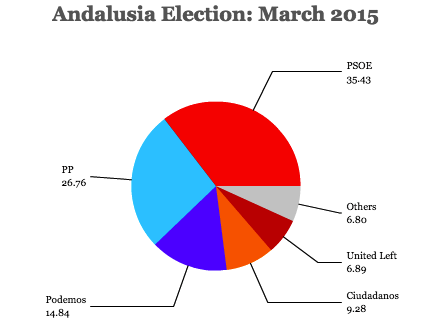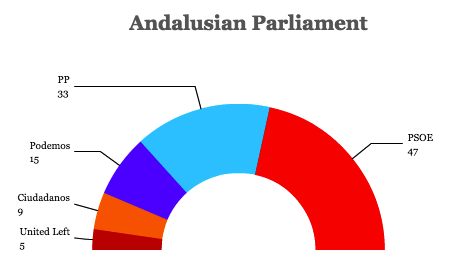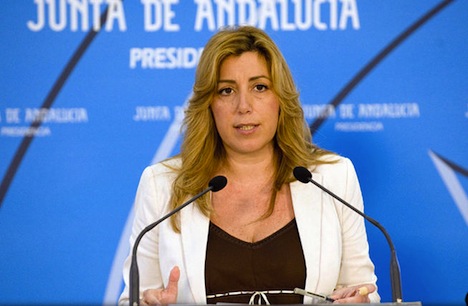After last Saturday’s election, it’s no exaggeration to say that Andalusia’s regional president Susana Díaz might be the most popular politician in Spain.![]()
![]()
Díaz, who heads the Partido Socialista Obrero Español (PSOE, Spanish Socialist Worker’s Party) in Andalusia, the largest region — or ‘autonomous community’ — in Spain, won her first term as regional president since taking power in 2013 upon the abrupt resignation of her predecessor, José Antonio Griñán. Both Griñán and Manuel Chaves, who governed the region between 1990 and 2009, are under investigation for their connection to a wide-ranging ‘ERE’ corruption scandal involving the diversion of funds designated to assist laid-off workers in Andalusia, where the unemployment rate remains stubbornly high at 34%, the worst in Spain, where joblessness also remains stubbornly high, despite its economy’s tepid 1.4% growth last year — the first year of GDP expansion since 2008.
Those two concerns, jobs and corruption, dominated the campaign in Andalusia, the sprawling southern region of Spain.
* * * * *
RELATED: In Andalusia, Díaz takes office with staggeringly high unemployment, economic woes (September 2013)
* * * * *
Though Andalusia has been a Socialist stronghold since the return of democracy in the late 1970s, disillusionment with widespread corruption and with Spain’s deteriorating economy gave the center-right Partido Popular (PP, People’s Party) of prime minister Mariano Rajoy its first Andalusian electoral victory in March 2012. Despite the Socialists’ losses, the party remained in power by forming a coalition with a smaller left-wing coalition of parties, Izquierda Unida (IU, United Left).
The Socialist-IU coalition continued under Díaz, who at age 40 is pregnant with her first child and who still marks a sharp contrast, generational and otherwise, with the region’s previous Socialist leaders. Díaz, a sharp-tongued populist who declined to contest the party’s national leadership, has also declined (so far) to challenge the PSOE’s leader Pedro Sánchez to become the prime ministerial nominee in November’s general elections.
Her victory in Andalusia’s March 22 snap election, called in January after Díaz wearied of the IU’s demands as junior coalition partner, will give hope to Sánchez and the national PSOE leadership that it can thrive throughout the 2015 electoral gauntlet.
An additional 13 regions will hold elections on May 31, including Madrid, the Valencian Community and Castile and León, the third, fourth and sixth most populous regions in Spain, respectively. Rajoy’s PP and its allies are defending governments in 11 of the 13 regions, including each of Madrid, Valencia and Castile and León. The party’s 17-seat loss in Andalucia, therefore, is an alarming sign for the ruling party. Continue reading Socialists thrive in Andalusian regional elections



